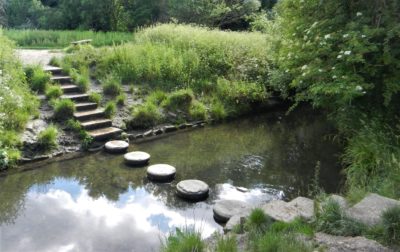Touchstones Into Stepping Stones
By Christine R.

Walking into these rooms only to hear “pain was the touchstone of all spiritual progress,” how heartily I wanted to run the other direction! My alcoholic story was rife with pain and abject misery, going day to day, hour to hour haunted by a river of pain. Loneliness and pain. Wanting only to drown them—not face them. The last thing I wanted was more pain. By working the steps, taking days one at a time, I came to understand the rest of the lines: “The pains of drinking had to come before sobriety, and emotional turmoil before serenity” (Step 10, pgs 93-94, Twelve Steps and Twelve Traditions).
First of all, what qualifies as a touchstone? Touchstone is defined as a threshold, a gauge, a baseline. For us, the baseline bottom line is that some sort of pain brought us through the doors of A.A.: A court-ordered restraining order, the pained look in the eyes of a child, the loss of one’s family, home, car, employment—all things meaningful to life. Pain is an initial touchstone. At the same time, pain becomes the gift. Our painful past “may be of infinite value to others” who are struggling to get sober. The man with three days has personal experience for the man with three hours on how to get through one more day without drinking. We all have something to share. As Bill pointed out, “pains of failure become assets.”
The answer to why “most alcoholics have to be pretty badly mangled” came while I was crossing the Golden Gate Bridge with my friend, Luke, a long-time member in my home group. Racing at top-speed in his Jaguar, Luke gave me a gentle nudge on the shoulder and asked if that got my attention. “Not really,” I replied. Then Luke gave me a strong push against my arm, asking if that got my attention. “Not that much,” I said. Then Luke damn near pushed me out the door asking, “Now do I have your attention?” Shrieking like banshee, I shouted, “Ok! Ok! You got my attention!” Hooking me back in, Luke said alcoholics are like that. We need a big, fat shove out a moving vehicle before we do anything.
The self-imposed crisis and the incomprehensible pain they talk about was the very thing that drove me into A.A. right on through to the doors of the Mill Valley Cabin Meeting. Getting to a 7 a.m. meeting was a pain but nothing like the non-stop pain of fear, bewilderment and isolation. My disease had me by the throat. The only reason my alcoholism let me live was to provide transportation to get more booze.
Eventually, came the discovery that willingness provides the flexibility to surrender, to listen and to change. When my sponsor asked if I were willing to go to any length to stay sober, the response was a resounding “Yes!” Thanks to the terrific beating my alcoholism administered, came the deep quality and principle of willingness.
The way through is the way out. Like the Gordian knot, the more we fight alcoholism, the tighter the noose. Through the pains of getting sober, sometimes right down to the DTs, touchstones can transform into stepping stones, 12 of them in fact. Touchstones need not be painful. Meetings, sponsors and phone calls provide ways out from under. With these new baselines we transition from daily drinking into daily sobriety.
Sobriety came easier seeing my sponsor seated in the same place, at the same time, alongside other steady members. Simply by showing up every day and participating made all the difference to us newcomers. Eventually we transform touchstones into stepping stones for ourselves and for those about us, one day at a time.


